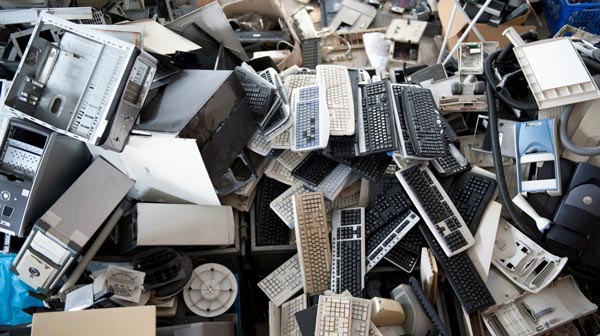Elevate Your E-Waste Administration With R2 Accreditation: a Detailed Summary
One trick approach to elevate e-waste monitoring methods is by attaining R2 accreditation. By discovering the benefits and processes associated with R2 accreditation, a much deeper understanding of just how it can revolutionize e-waste administration strategies emerges, shedding light on a path in the direction of sustainability and moral disposal methods.
Significance of E-Waste Monitoring

When e-waste is not managed appropriately, these harmful materials can seep right into the ecosystem, triggering harm to wildlife and possibly entering the food cycle, posturing risks to human health. Moreover, the improper disposal of e-waste adds to air pollution and greenhouse gas emissions, worsening environment change and environmental deterioration.

Advantages of R2 Accreditation

First of all, R2 certification enhances reliability by showcasing a company's commitment to sustainable practices. It guarantees clients, companions, and stakeholders that the business sticks to rigid requirements for e-waste management - r2 certification. This credibility can lead to increased depend on and enhanced connections with clients that prioritize environmental obligation
Second of all, R2 qualification aids minimize threats linked with inappropriate e-waste disposal. By adhering to the rigorous standards stated by the certification, organizations can lessen the chance of data violations, ecological contamination, and lawful effects. This proactive approach safeguards the business's track record and decreases possible responsibilities.
Lastly, R2 certification demonstrates a commitment to environmental stewardship - r2 certification. By responsibly managing electronic waste through certified processes, organizations add to the conservation of resources, decrease of air pollution, and promo of a round economy. This commitment not only profits the environment but also aligns with developing consumer assumptions for lasting organization practices
R2 Certification Process Summary
Having actually developed the advantages of R2 certification in promoting integrity, threat reduction, and ecological stewardship, it is important to now describe the comprehensive process entailed in acquiring this accreditation. The R2 certification procedure starts with a complete evaluation of the organization's functional policies and procedures to make certain conformity with the R2 standard. This first analysis is vital in determining any gaps that require to be dealt with prior to continuing additionally.
When the company's methods align with the R2 typical demands, an independent third-party auditor carries out an on-site audit to evaluate the execution and performance of these methods. This audit includes a detailed evaluation of paperwork, interviews with team, and weblink physical assessments of facilities to validate conformity.
Adhering to a successful audit, the company gets an accreditation decision based on the auditor's searchings for. If authorized, the company is given R2 qualification, demonstrating its dedication to responsible e-waste monitoring. It is essential to keep in mind that preserving R2 qualification requires continuous compliance with the requirement's requirements and routine audits to ensure continued adherence to best practices in e-waste recycling and disposal.
Trick Standards for R2 Compliance
An important facet of achieving R2 conformity is guaranteeing that all digital waste (e-waste) handling facilities fulfill stringent environmental and safety and security standards. To abide with R2 requirements, organizations need to abide by essential requirements that focus on liable e-waste management practices. These criteria consist of executing a recorded environmental, health and wellness, and safety administration system, making sure the safe and secure handling of data-containing tools, and performing extensive downstream due diligence to track the final destination of e-waste materials.
Furthermore, R2 compliance necessitates the proper testing, refurbishment, and recycling of electronic equipment to expand its valuable life and decrease ecological influence. Facilities looking for R2 qualification have to additionally focus on worker health and wellness and security by offering necessary training, personal protective equipment, and a secure workplace. In addition, keeping in-depth documents of e-waste processing activities and on a regular basis undertaking audits by approved certifying bodies are important elements of demonstrating continuous compliance with R2 requirements.
Effects of Lasting E-Waste Practices
The implementation of sustainable e-waste practices in conformity with R2 conformity not only guarantees environmental and safety and security criteria are satisfied however additionally substantially influences the general lifecycle of go right here electronic items. By sticking to R2 requirements, digital waste monitoring procedures end up being much more efficient, decreasing the environmental footprint of digital products. Sustainable e-waste techniques assist in the appropriate disposal of electronic components, ensuring that harmful products are dealt with responsibly and do not wind up contaminating the environment.
Furthermore, accepting sustainable e-waste techniques advertises the circular economic situation by promoting the recuperation and reuse of important materials from electronic products. This not only preserves valuable resources but additionally minimizes the need for basic material removal, lessening the environmental effect of electronic production. In addition, sustainable e-waste techniques can contribute to task production in the recycling and refurbishment industries, cultivating economic development while promoting ecological responsibility. On the whole, the fostering of sustainable e-waste methods under R2 certification works as a vital step in the direction of achieving a much more environmentally sustainable electronic devices industry.
Conclusion
In final thought, carrying out appropriate e-waste administration techniques is crucial for environmental sustainability and source preservation. R2 qualification plays a crucial function in making sure accountable handling and disposal of electronic waste. By adhering to the rigorous standards imp source stated by R2 requirements, organizations can not just decrease their ecological effect but additionally add to a much more sustainable future for generations ahead.
One trick technique to elevate e-waste management techniques is by obtaining R2 accreditation. By exploring the advantages and procedures connected with R2 certification, a deeper understanding of just how it can change e-waste administration techniques emerges, dropping light on a course towards sustainability and ethical disposal methods.
The R2 certification procedure begins with an extensive review of the company's operational plans and procedures to ensure conformity with the R2 standard. If accepted, the organization is granted R2 accreditation, demonstrating its dedication to liable e-waste administration. Overall, the fostering of sustainable e-waste methods under R2 certification serves as an essential action towards achieving a much more environmentally lasting electronic devices market.